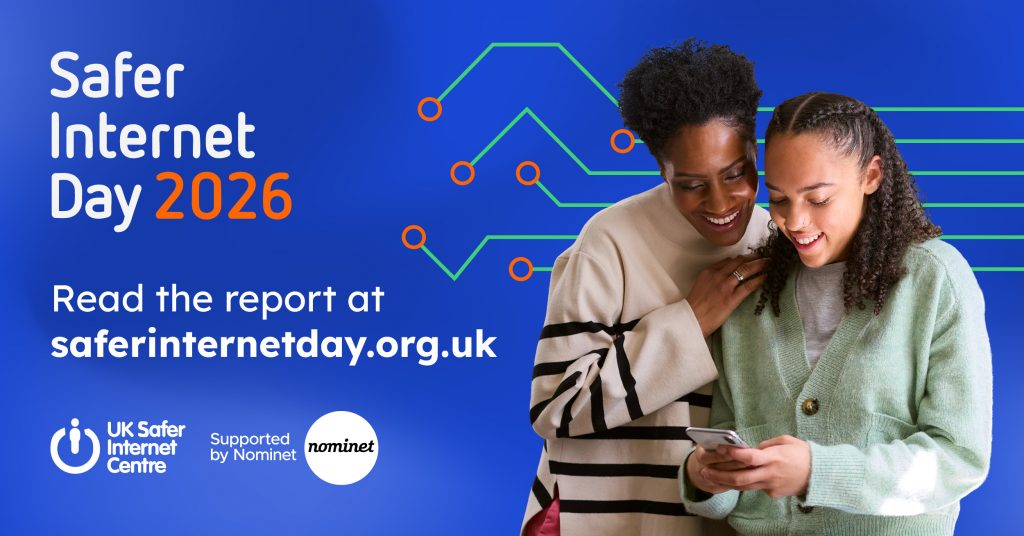
Young people keen to educate parents on online safety – as more than a third of carers are not clear on where to go for support
Research reveals the need for more and better conversations with young people about what they do, see and experience online.
- Young people are keen to educate their parents and carers, with 57% feeling they can help to educate them about being safe online
- 36% of parents are not sure of where to go should they need support
- 71% of young people feel responsible for reporting bad or potentially dangerous behaviour online. However, only 22% have reported someone or something troubling.
- At least 80% of 8 to 17-year-olds would turn to their parents or carers if they saw something worrying or upsetting online
- However, some young people don’t feel able to talk with nearly one in 10 (7%) reporting they couldn’t have a conversation with anyone about their life online
Research commissioned by the UK Safer Internet Centre (UKSIC) for Safer Internet Day reveals more than half (57%) of young people believe they can help educate parents or carers on internet harms. This response comes as although more than three quarters (77%) of children and young people say their parents regularly talk to them about their online lives, over a third (36%) of parents, and carers admit they’re not certain where to turn should they need support or access to resources when it comes to online safety.
The research, conducted by Censuswide, received more than 4000 responses from parents, carers and young people. At least 80% of those aged 8 and 17 say they would confide in their parents and carers if they saw something worrying or upsetting online – including unwanted contact, bullying and fake news.
UKSIC Director, Will Gardner OBE, said:
“Our research shows a real desire amongst most parents, carers and young people to start a conversation about online safety. It also highlights the importance of our role in ensuring parents feel equipped to have these conversations when they arise – especially as young people are ready to talk at home about their online lives.”
Safer Internet Day is supported by over 3,000 UK organisations, from sectors ranging from education and policing to business and charities, who are running activities right across the UK. They join the UK Safer Internet Centre in its mission to promote the safe, responsible and positive use of digital technology, working to support young people and those that support them. The UK Safer Internet Centre, the organiser of Safer Internet Day in the UK, is hosting an event today (7 Feb), run directly by young people, for policymakers, industry experts and the wider online safety community to place youth agency at the heart of advocating for positive change in their online safety.
“Many children in my school believe that it is equally important to learn about passwords and how to use the internet safely, as well as learning English and Maths.” (Childnet Digital Leader, age 11)
Encouragingly, more than three-quarters (77%) of young people say their parents and carers talk to them about their life online, including being safe online. The research also shows overwhelmingly that parents and carers are the first port of call to young people if they are troubled by something online. This applies across issues as diverse as unwanted contact, bullying, scams, or fake news. For example, 85% of young people say they would turn to their parents or carers if they were contacted by someone who makes them feel uncomfortable.
While it’s positive that dialogue is happening at home, young people, parents and carers tell us there is scope for more and better conversations. Young people recognise they can play a role in online safety, with over half (57%) keen to educate their parents about being safe online. Meanwhile, 69% of parents and carers want to speak with their children about online safety more easily and often.
Navigating online safety in the classroom
As well as at home, conversations around online safety are important at school. Positively, 80% of children and young people say they have regular online safety lessons at school. Seven in 10 (71%) young people find these lessons useful, showing the critical role that teachers and schools play.
However, while online safety education is proving extremely helpful for many people, 62% of young people feel online safety education in schools could be better, with almost a third (30%) stating that these lessons don’t allow them to discuss the issues they are worried about. This further highlights the need to pay closer attention to understanding what young people most want and need to talk about when it comes to discussing their online lives at school.
Encouragingly, young people are keen to play their part in the classroom, with nearly half (44%) of young people saying they can make a difference in supporting and promoting being safe online at school.
Peer-to-peer conversation is also important in helping young people navigate their online lives. Most young people feel they could talk to other friends if they were worried about another friend (78%) online or something else they came across online (77%). Furthermore, they want to support each other; over half (58%) say they feel they can help their friends know more about being safe online.
Conversations about young people’s lives are more important than ever
The online world’s influence on young people’s daily lives is ever-increasing. 81% of young people aged 8-17 said they go online at least twice a day, with 45% going online to talk to friends, 50% going online to play games and more than half 56% going online to watch videos, for example, on YouTube or TikTok.
Reassuringly, children and young people feel that they have a responsibility to others when it comes to life online, with nearly three-quarters (71%) saying they have a responsibility to report when they see something or someone being offensive, mean, or nasty online, and 62% wanting to act and support others in being safe online.
However, while it is clear many young people understand the necessity of conversations about life online, only 22% of young people have ever reported something or someone online for worrying or bad behaviour, either by reporting through a specific site, speaking to a trusted adult or telling a friend. This reveals the need for more and better conversations with young people about how often and why they may not be speaking with anyone about something that troubles them online.
Making space for conversations online
While conversations about being safe online are already taking place at home and in the classroom, the research shows there is still a way to go.
Most young people (62%) want to act and support others in being safe online, with nearly half (43%) saying they want to report something and someone online more easily. More than one-third (35%) say that having more support from the online industry about online safety education would make life online more enjoyable and safer for all.
Young people also suggest ways in which online platforms and Government could help them have a voice, with one in five (21%) young people expressing support for a young person’s forum in parliament dedicated to being safe online and more than a quarter (26%) of young people saying they would like relevant media to have a section run by young people dedicated to being safe online.
UKSIC Director, Will Gardner OBE, says:
“For Safer Internet Day this year, we are putting the voice of young people front and centre, and these responses really highlight that youth voice is key both in and out of the home. Our research also makes clear that young people want to play their part in online safety, in school, with their parents and carers, and online. Our hope for this Safer Internet Day is that it will help inspire crucial conversations, and encourage young people to speak up, and that we all listen, so we can ensure we are supporting all young people online as best we can and work with them so we can make the online environment safer for all.”
Cosima, Age 16, a Childnet Digital Leader and Champion for Safer Internet Day 2023, says:
“Safer Internet Day shines a light on the daily issues that young people from all backgrounds face, creating a platform for them to be heard by change agents. When coming from young people, issues like internet safety, which are so often cast aside as inconsequential or unachievable due to their scale, can’t be ignored. When it comes from voices of the future and the most vulnerable in society – people must listen, which is what sets Safer Internet Day apart.
We are calling for tighter regulation of content online and increased responsibility from organisations so that the internet can revert to being a space for education and communication instead of unachievable standards and unrest.”
Secretary of State for the Department for Digital, Culture, Media and Sport, Michelle Donelan MP, says:
“The learning and conversations which happen on Safer Internet Day are vital to helping young people have positive online experiences.
“But our children deserve an internet designed with their safety at its heart. That is what we are achieving with our pioneering Online Safety Bill, and that is why I have gone even further by strengthening the protections for kids, so they are shielded from illegal and age-inappropriate content online.
“We are on track to pass this new law this year to bring much-needed accountability to social media firms and peace of mind for parents and young people across the UK.”
Coordinated in the UK by the UK Safer Internet Centre (UKSIC), Safer Internet Day is celebrated in over a hundred countries coordinated by the joint Insafe/INHOPE network and national Safer Internet Centres across Europe. In the UK, the work of the UKSIC, including the organisation of Safer Internet Day, is made possible by funding by Nominet and others (see www.saferinternetday.org.uk).
Read the research:

Almost all young Brits use AI – more than half say it makes life better
Research for Safer Internet Day 2026 reveals 60% of teens worry about AI being used to make inappropriate pictures of…

1 week to go – get ready for Safer Internet Day 2026!
In this blog we want to give you a quick rundown of how you can help us to make Safer…